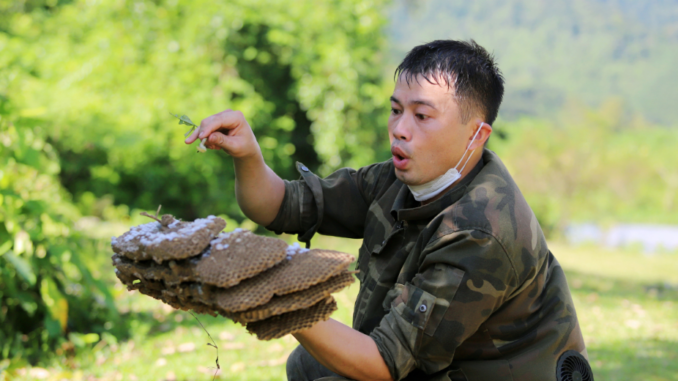
HA TINH – People in Son Hong commune, Huong Son district, cross the forest, and wade through streams to collect wasp nests for processing or selling for profit.

In the ninth lunar month, the forests, bushes, and cliffs along the stream in Son Hong commune, Huong Son district, are inhabited by bumblebees. They often choose closed locations, low traffic, dense trees and rugged terrain to build nests.

Mr. Phan Van Chien, 34 years old, residing in Son Hong commune, brought protective gear, forest tools, some necessities, and some friends who drove motorbikes to the forest more than 7 km from home to hunt bees. paintbrush.
Stopping the car at the edge of the forest, the two men walked, occasionally using binoculars to observe the bee’s path, looking for their nest. “We use binoculars to track bees hunting, fetching water, following them back to the hive. Because they are familiar with the terrain and experience in the forest, identifying the locations is not too difficult,” he said. Chien told.

When they discovered a beehive more than 500 meters away from their position, the two men crossed the melaleuca forests to approach.
According to Chien, every year in the third lunar month, the queen bee will choose suitable places to nest, lay eggs and take care of eggs to create a colony. Young bees as adults will continue to hunt and build nests.
By August-September, the bee colony develops the strongest of the year, pupating a lot. In the winter, the queen bee will give birth to other top bees, which fly away to separate into many swarms.

Found a beehive by a large rock, the companions support each other by wearing protective gear. These suits are made of thick, sealed nylon, with a transparent nylon textured top to help hunters see their surroundings.
“The bumblebee has extremely toxic venom. The process of taking the nest is very dangerous, if the protective clothing is not guaranteed, they will be stung, affecting their lives. In addition, if the bees discharge a lot of waste, they will easily cause damage to the eyes. vision loss, even blindness,” Chien said.

After 5 minutes of wearing protective gear and carefully wearing gloves, the two men used luminescent knives to thread their way through the bushes, approaching the swarm of bees nesting next to a large silver stone block, next to the stream.
According to Mr. Chien, when approaching, workers will rely on the size and weight of the hive to decide whether to exploit or not. The selected nests must meet the requirements of 5 layers of bees, weighing more than 3 kg.
The nest that Mr. Chien found is estimated at 5 floors. To separate the “house of bees” from the large rock, Mr. Chien used a knife and made several cuts near the position between the nest and the rock.

Hundreds of bees flew, clinging to the hunter’s protective clothing. After 5 minutes, Chien was able to separate the wasp nest weighing more than 3 kg from the stone block.
“When taking the nest, in addition to using protective gear, you can use fire and smoke. However, we chose the option of exploiting the nest with protective gear, because if using fire, the queen and the adults will die. , losing the ecological balance. Workers only harvest the pupae, let the adults fly away to grow and build new nests,” said Mr. Chien.

Taking the 5-storey honeycomb out, the hunter uses his mouth to blow hard so that the remaining adult wasps fly out, avoiding it to attack him again.
After mining, the hunters continued to cross the forest, wading streams to find other wasp nests. Depending on the weather, on this occasion, people go hunting for bees for about 7 hours each day, collecting 8-10 kg of nests.

At midday, after taking the two hives, the workers were exhausted and sweat ran down their faces. To regain their strength, they sat down in the middle of the forest drank milk and ate dry food, resting for about half an hour and then continuing their journey.

The two bee hunters returned home when they had obtained several layers of bees. Each wasp nest weighs 3-5 kg and is bought by traders for 150,000 a kg.

In addition to selling the nest when meeting customers who pay a high price, the hunter also brings the nest home, taking the pupae inside to process it as food. To remove the pupae from the nest, use tweezers to remove the protective film, then gently remove them.
“This work requires meticulousness and ingenuity, if you press the tweezers too hard, the pupae will be broken,” a resident said.

Pupae taken from the nest can be divided into three types. Two porcelain bowls with white and yellow pupae are young and about to become bees. The other bowl contains young, black bees. With a 3 kg hive, it takes two hours to get all the pupae out.

The pupae and young bees are blanched in boiling water for re-hunting. The chef will use a sharp toothpick to poke the middle of the pupa to remove the intestines. Because the pupa is small, it must be done skillfully and lightly to keep the whole body intact.
After preliminary processing, bee pupae will be sold to restaurants and pubs for 500,000 VND per kg. Young pupae are processed and sautéed with lemon leaves, doing this way will feel the aroma and greasy taste. The young bees are deep fried.
“It takes a lot of time and effort to prepare the finished pupae, so we often choose to sell the whole nest,” Chien said.
Follow (vnexpress)
